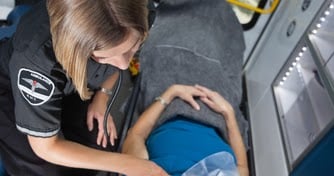Clinicians have searched with mixed success for interventions shortly after trauma occurs to...
PTSD Increases Risk for Type 2 Diabetes in Women
 |
Researchers from Harvard School of Public Health and Mailman School of Public Health at Columbia University analyzed data from a 22-year longitudinal study with nearly 50,000 women subjects—between ages 24 and 42 at study enrollment—to examine whether an association exists between PTSD and the incidence of type 2 diabetes in civilian women.
The analysis showed that PTSD symptoms were associated with the development of type 2 diabetes in a “dose-response” fashion—the greater the number and severity of PTSD symptoms, the greater a woman’s risk of developing type 2 diabetes. Of the approximately 2,000 women who reported the highest number of PTSD symptoms (six to seven symptoms) in any given year of the study, 12 percent of them developed type 2 diabetes, whereas less than 7 percent of the women who reported no trauma exposure had type 2 diabetes. Results also showed that antidepressant use and elevated body mass index associated with PTSD accounted for nearly half—34 percent and 14 percent, respectively—of the increased risk of type 2 diabetes in participants with PTSD. Smoking, diet quality, alcohol intake, and physical activity did not increase risk for type 2 diabetes in women with PTSD, according to the study.
Lead author Andrea Roberts, Ph.D., a research associate in behavioral science at Harvard School of Public Health, stated that “women with PTSD and the health professionals who care for them should be aware that these women are at greater risk for diabetes. As fewer than half of Americans with PTSD receive treatment, our study adds urgency to the effort to improve access to mental health care to address factors that [could potentially] contribute to diabetes and other chronic diseases."
To read more about psychosomatic risks related to PTSD, see the Psychiatric News article “APA Calls for Better Training to Treat Chronic Pain, Addiction Among Vets.”
(Image: Feng Yu/shutterstock.com)





